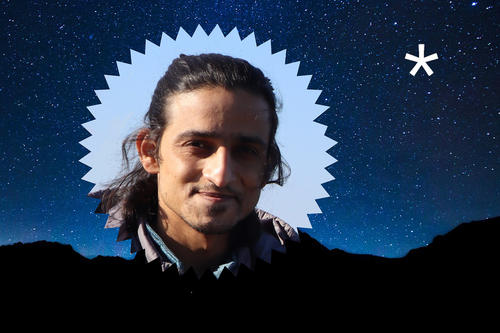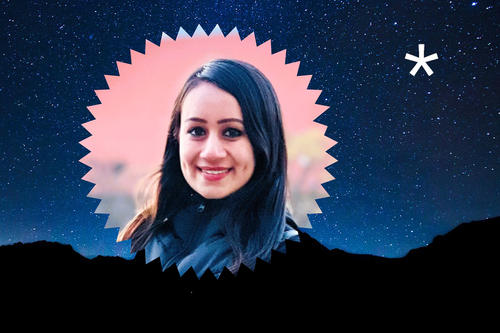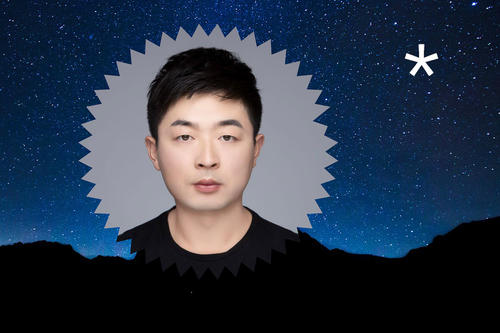May we introduce: Amit, Sanjam and Bo, Rising Star Fellows 2021
Amit Pandit
The medicinal chemist Amit Pandit came to Freie Universität Berlin as a Rising Star Fellow in November 2021.
He would like to use the scholarship to study the project entitled “Design, synthesis, and biological characterization of multitargeted Indolamine-2,3-dioxygenase (IDO) / Tryptophan-2,3-dioxygenase (TDO) inhibitors”. The interdisciplinary project from the Institutes of Pharmacy and Chemistry/Biochemistry at the Freie Universität Berlin and the Faculty of Pharmacy at the University of Ljubljana in Slovenia provides key elements for development of new anti-cancer agents. At tumour microenvironment, immunomodulatory effect by IDO/TDO inhibitors averts the cancer progression and therefore bears the potential to identify new therapeutic ways to target cancer.
Amit Pandit studied Pharmacy at the School of Pharmacy, Devi Ahilya University in India. Subsequently he obtained his Ph.D. degree in Chemistry at the Indian Institute of Technology Indore. During his academic carrier he published in top journals, won a few of awards and already filed four patents.
“Interdisciplinary research scope was my key motivation for the fellowship application. New drug development requires the expertise as well as facilities in the field of Pharmacy, Chemisty and Biology for tasks like in silico designing of new drugs, chemical synthesis and biological activity evaluation respectively. The Rising Star fellowship provides the most appropriate environment for the proposed project. The Department of Biology, Chemistry, and Pharmacy at Freie Universität Berlin is a big department and provides excellent platform for interdeciplinary research activities. At the Institute of Pharmacy, I have observed that students are working on the collaborative projects which is very important for learning progress. After completing the current research project, I will gain confidence in research planning and execution in medicinal chemistry. The acquired knowledge will help me to find a research position at a university or in industry in Germany.”Sanjam Chandna
The biotechnologist Sanjam Chandna came to Freie Universität Berlin as a Rising Star Fellow in November 2021. During her stay in Dr. Stephan Block’s research group at the Institute of Chemistry and Biochemistry she would like to focus on developing biomass derived functional scaffolds for multivalent binding and inhibition of viruses, such as Influenza A virus and SARS-CoV-2.
She is convinced that the evolving global emergency for development of effective treatment solutions for infectious diseases needs to be addressed through innovative approaches through development of functional biomaterials. She proposes to develop bioinspired hydrogel-based scaffolds, which will act as a decoy to capture viruses such as the influenza A virus and the current corona virus SARS-CoV-2. For this, the size and functionalization with virus attachment factors play an important role for achieving high inhibition of the targeted virus. Therefore, the functionalized inhibitors will be developed with molecular weight in the range of megadaltons scale. These virus inhibitors will be utilized to develop bioinspired hydrogels to study the virus interaction, binding and inhibition.
Sanjam Chandna studied Biotechnology at the SBS Post Graduate Institute of Biomedical Sciences and Research in Dehradun, India. Her Master’s Degree was in Biotechnology at the GGDSD College (Panjab University), Chandigarh, India. Subsequently she obtained her Ph.D. degree in Microbial Biotechnology at the Panjab University, Chandigarh in India. During her academic carrier she published in top journals and already filed four patents.
“Being an early career researcher, this junior fellowship will aid in boosting my career by providing support to carry out an innovative research project, further enhancing my leadership skills. This opportunity will help me in utilizing my knowledge and experience for finding solutions to some unexplored areas in science. Dr. Stephan Block’s lab has a stimulating aspect of working in interdisciplinary areas as well as experience in hydrogel-virus binding studies with Prof. Rainer Haag’s lab. This perfectly aligns with my research interests and would help me to learn new skills and techniques. Interestingly, this opportunity will also provide me exposure to a new place and to develop cultural competency for better understanding of different socio-economic values.After moving from India to Germany, I am able to experience and work in a different culture and educational system. Berlin, the capital city of Germany, is one of the most culturally-charged cities in the world. I moved in one of the coldest periods of the year to Berlin and I have received immense support from my supervisor, colleagues and all the staff of the Department of Biology, Chemistry, Pharmacy, in order to settle down. The work environment is motivating, uplifting and friendly, which has helped me to be comfortable with the new place.
The interesting thing about living in Germany is that I have the opportunity to learn a new language, i.e., German, apart from doing my research work. I am very delighted to work in the environment of Freie University Berlin and hope to uplift my research and interpersonal skills.”
Bo Tang
The ecologist Bo Tang is interested in the responses of soil processes to global environmental change. He came to Freie Universität Berlin as a Rising Star Fellow in December 2021.
Being funded by the fellowships, he would like to focus on the interaction between arbuscular mycorrhizal fungi (AMF) and soil microbes under global environmental change. Specifically, he would aim at firstly exploring how are the interactions between AMF and soil microbes regulated by host identity and global change factors (e.g. warming, drought and nitrogen deposition)? And then he looks forward to further exploring effects of these interactions on soil organic carbon (SOC) dynamics by both lab measurement and model training.
Since SOC is the largest terrestrial C sink, subtle changes in its size have the potential to greatly affect atmospheric CO2 and thus the future trajectory of climate change. This kind of study will not only improve our understanding for SOC dynamics in ecosystems dominated by AM plants, but is pivotal for accurately predicting terrestrial C-climate feedback especially in the context of global change.
Bo Tang received his B.S. of Biology in 2013, and M.S. of Ecology in 2016. In December 2020, he obtained his Ph.D. of Ecology from the Chinese Academy of Sciences. He has an outstanding publication output especially as first author during his Ph.D. period. He will spend two years working as a postdoctoral fellow, collaborating with Prof. Dr. Matthias C. Rillig and Prof. Dr. Britta Tietjen at the Department of Biology, Chemistry, Pharmacy at Freie Universität Berlin.
“During my doctoral studies, I learned plenty of excellent research and publications in Rillig’s lab website. Because my research interest is well aligned with that of his research group, so at that time I thought it would be great if I could join Rillig’s lab upon completion of my Ph.D. to continue my research. I decided to pursue the Rising Star fellowship to join his lab. With the tremendous efforts from both Prof. Dr. Rillig and Prof. Dr. Tietjen on my research proposal, I won the fellowship finally. When I arrived in Berlin, I was attracted to Freie Universität Berlin and this city. In Rillig’s lab, it is so incredible to bring together all these very excellent scholars from all over the world, so I learned a lot about the culture of different countries. I love the research atmosphere so much, and I really enjoy doing research here. The skills and experiences I gain will directly help me achieve my professional and academic goals.”

